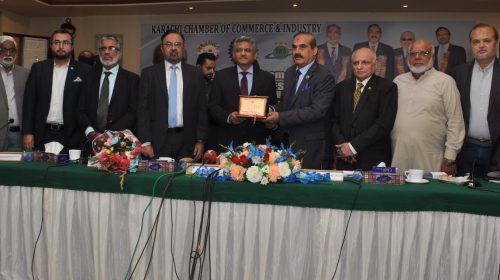KARACHI: Provincial Minister for Revenue, Industries and Commerce Muhammad Younus Dagha has said that worldwide gas tariff for industries is subsidized while the residential consumers are subjected to higher cost but unfortunately, in Pakistan, the industries are subsidizing all other sectors which is purely against international best practices.
“Structural changes in consultation with business community are needed to rectify all issues in the energy sector so that the industries alone could not bear the burden of exorbitant gas tariff hikes. Cross-subsidization by raising tariff for industries and keeping it down for others is not a wise move. Industries should only be burdened with gas cost while cross-subsidy should not be applied to industries”, he added while speaking at a meeting during his visit to the Karachi Chamber of Commerce & Industry (KCCI) on Wednesday.
Chairman Businessmen Group (BMG) Zubair Motiwala (Via Zoom), President KCCI Iftikhar Ahmed Sheikh, Senior Vice President Altaf A. Ghaffar, Vice President Tanveer Ahmed Barry, Former Presidents Majyd Aziz and Shamim Ahmed Firpo along with KCCI Managing Committee Members attended the meeting.
Younus Dagha identified ‘lack of unity’ as the biggest issue of industries in Karachi since many years which terribly mutes down the business community’s say about energy crises. “This is the basic reason why Faisalabad, Lahore and other cities having unified voice succeed in compelling the government to fulfill their demands and Karachi, despite contributing massive revenue and exports, is not given much attention.”
He said that although the provincial government has a very limited mandate in energy crises but all possible efforts will be made to deal with the energy crises. “In this regard, I’ll try to arrange a meeting of representatives of KCCI and other industrialists with Chief Minister Sindh at the earliest so that we could together suggest structural changes and the same can, subsequently, be taken up by the Sindh government with the federal government”, he added.
In response to Chairman BMG’s remarks, Yonus Dagha agreed that the case of incremental consumption of electricity during winter season has not been presented properly to IMF as it was logical to utilize the idle capacity which would bring down the circular debt. He advised that the business and industrial community should approach the IMF’s Islamabad Office to submit their reservations about misrepresentation of incremental consumption case.
He further opined that the citizens of Karachi pay at least Rs3 to Rs5 extra per unit to KE on account of Fuel Cost Adjustment every month as compared to other DISCOs because of KE’s obsolete power generation plants which needs to be unbundled. “The electricity supply system stands completely unbundled across Pakistan where distribution and generation are treated separately but KE is the only utility service provider which solely generates and distributes electricity to consumers.”
Chairman BMG Zubair Motiwala, who joined the meeting via Zoom, stated that the overall industrial performance has declined drastically since the start of November 2023 which can be confirmed by examining the gas offtake of SSGC to industries which has declined by more than 25 percent as the industries are not in a position to carry out production at such an exorbitant cost triggered by unbearable hike in gas tariffs. “You’ll not find a single example all around the world where industries have been subjected to gas price hike of 130 percent in one go”, he said, adding that it seems that the government wants to close down the industries in Karachi who are tuned to gas for carrying out production activities and simply cannot go for any other fuel due to limited available space.
He said that raising gas tariff to such an unbearable level was a sheer injustice to a city which represents 10 percent of country’s population and contributes 54 percent exports and 68 percent revenue to the national exchequer. Gas price has been hiked with an excuse of dealing with circular debt of Rs400 billion which was purely not because of industries but due to other sectors including fertilizers and domestic sectors yet the industries have been penalized. “The circular debt issues should have been brought down in phases to save the industries from complete closure instead of imposing unbearable gas tariffs for dealing with circular debt in one go”, he added.
Referring to IMF’s move to turn down request of providing electricity at lower rates during four months on incremental consumption, he said that it was purely in favor of the economy which would have been a perfect source of dealing with many economic issues including the circular debt issue and created a win-win situation. “It appears that the case has not been properly presented to the IMF otherwise they would have certainly agreed to provide electricity at lower tariffs on incremental consumption as it would ensure that industries stay operational, he said, adding that recovery of Rs400 billion circular debt should have been done in at least four to five phases.
He said that although assurances have been given from time to time but to date, Rs7 billion of previous winter package, out of total pending dues of Rs27 billion, have not been released to the industries.
He feared that the industrial performance and the exports would drop further and the import-substitution industries would shut down if relief in the form of reduced energy tariffs is not announced at the earliest.
Earlier, President KCCI Iftikhar Ahmed Sheikh, while appreciating the positive approach adopted by Younus Dagha in resolving issues, stated that the economy was going through a very difficult phase and the situation was likely to worsen further as the industrial performance was also going down mainly due to exorbitant hikes in gas and electricity tariffs. “50 percent of the industries have already closed down as they were unable to bear the burden due to enhanced electricity bills and many others will also close down very soon due to 130 percent increase in gas tariffs, plunging the economy to a point of no return”, he added.
He further that the gas supply suspension for two days a week has also terribly affected the performance of industrial sector which faces 28 percent production losses every week. In this scenario, the exporters will not be able to compete in the international market and lose share as the impact of enhanced energy tariffs cannot be added to the cost of exportable goods, he added.
He said that the infrastructure in all industrial zones of Karachi was in a terrible state which requires special attention of Sindh government as due to poor infrastructure the industrialists have been facing a lot of problems everyday whereas the foreign buyers are also reluctant to visit factories.
While welcoming various digitalization initiatives taken by the Caretaker Sindh Govt, Iftikhar Sheikh extended full support and cooperation in dealing with issues and creating an enabling business environment by doing away the bureaucratic hurdles.
Younus Dagha for providing gas at cost to industries, ending cross-subsidization






